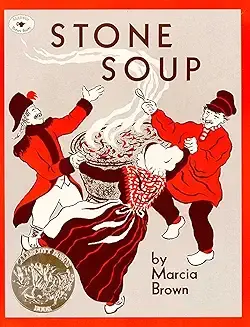Stone Soup: What Does It Mean?
- Barbara G. Tucker
- Nov 4, 2025
- 4 min read

With the cold, damp weather in Northwest Georgia, I had a hankering for soup, particularly potato soup, since I ingredients. I’m making it now, that is, this morning. Cutting up the potatoes got me thinking about the old story, “Stone Soup.” I am not sure children still learn this story, but they should, although as with all stories, some could argue that there are life lessons or themes that are counterproductive for children.
As a side note, I sometimes say I’m making stone soup when I take a basic recipe for chili or vegetable soup and start tossing in more ingredients just because I have them in the frig. Like corn or black beans or black eyed peas or a squash. I learned this story very young and it may have been the context of it that stuck in my memory more than the actual story. You see, I had a neighbor as a child, a girl probably eight years older than me, who wanted to be a teacher and would hold classes for the younger kids on the street. I could name her but won’t here. The read the story to me from a big colorful book. I was one of her star pupils because she paid me attention. (I was an odd child.)
The story, in my version, involves a trio of soldiers returning from the wars (European, of course, in this depiction) and walking through towns. They are hungry and come to a village where they go door to door to ask the villagers for something to eat. They are turned away; “we have nothing to share,” the residents say. Soldiers being soldiers, they know how to survive, so they set up a fire in the middle of the town, light a fire, and fill a pot with water.
When the townspeople become curious as to what they are going to cook since no one has given them ingredients, one of them pulls a large smooth stone out of his knapsack and says, “Stone soup. This is a magical stone we carry with us to cook when we are hungry.”
The mystified people gather around. They start discussing what would make the soup better, and the soldiers agree or add their own ideas. “I have some potatoes,” one woman says, and runs home to get them. Another brings carrots, another onions, some broth or tallow or meat, and so on. “We will need a bigger pot,” the soldiers say, so someone brings a huge kettle, and more ingredients come.
Eventually there is more soup than the soldiers can eat, and the villagers bring tables and utensils and bread and they all feast on the stone soup. In the end, the soldiers wipes off the stone and puts it back in his knapsack for another day and another village.
One might say, “This is a story of the soldiers lying and manipulating the townspeople. They scammed them.” OR “This is a story about people foolishly believing a lie, a myth that they should have seen through.” OR “This is a story about the ends justifying the means. A good outcome—full stomachs and people coming together for a dinner they could enjoy—happens from a lie and deception.” OR “This story is about communism and lies that lead people to give up their rights to property.” (Far-fetched? Not in today’s politicized climate.)
Maybe.
You could also say the story is about vision. The people did not have the vision to be generous. They saw their resources as limited and unshareable. The soldiers showed what they had and displayed hope that they could make soup out of a rock and hot water and that caught the imagination of the people to the extent that they changed their own view of their resources and generosity. It’s not unlike The Wizard of Oz or other stories of magic/not magic, including The Music Man. And one might also think, "The selfish townspeople are the villains and deserved to be deceived. If these were soldiers from their own country, why couldn’t they share their food with those who defended their country?” (See footnote.)
I think there is a lot going on in this story, about story. One, any story has multiple meanings, both to the individual and to a larger cultural group. As the Wikipedia article below shows, it is an old story with many cultural variations. Second, imagination and a little bit of creative deception is part of all stories. I am finishing the first draft of a novel today (I hope) and while it is based on a real-life incident (two actually), I am presenting a truth that is not. The saying, "Fiction is a lie that tells the truth" is not something I really subscribe to, but we fiction writers do present false people and situations as real.
And it is potent: So much that a once-little girl, probably five at the time, can remember it when she makes potato soup sixty-five years later.
Footnote: the European origins of this story might include that these are mercenaries, not members of a standing army who were seen as defenders of the people. Soldiers were as likely to be libertines in some times of history.
Wikipedia has articles on this topic: https://en.wikipedia.org/wiki/Stone_Soup:_An_Old_Tale and https://en.wikipedia.org/wiki/Stone_Soup

Comments